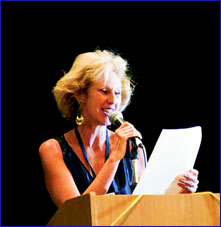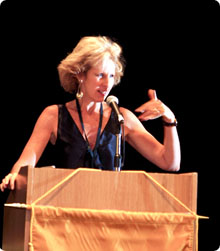Real REBT Alive and Kicking in Kortrijk with Dr. Debbie Joffe-Ellis

Debbie leads us with rational humorous songs
Since the death of Dr Albert Ellis on July the 24th 2007, Rational Emotive Behaviour Therapy and its younger sibling Cognitive Behaviour Therapy, have continued to flourish.
The last time I saw Dr Debbie Joffe Ellis was on a hot April day in 2007 in a rehabilitation and nursing home in New York City. She was almost singlehandedly nursing her sick and ailing husband, the legendary Dr Albert Ellis, creator of Rational Emotive Behaviour Therapy and Cognitive Behaviour Therapy. To the end he practiced what he taught; he unconditionally accepted self, others and the world and then worked to change what he disliked. He remained free from anxiety, anger and depression, even although he was deeply saddened when he was denied control of his Institute in the final years of his life. Al was voted one of the most influential therapists of the last 100 years and was a true heavyweight in psychology, author of over 80 books, 800 academic papers and Fellow of over 12 divisions of the American Psychological Association. He told me that REBT differed from CBT inasmuch it was more philosophical. He also defined rational as self-helping; “In REBT theory, rational mainly means self-helping, but because people practically always live in social groups or communities, it also means socially helpful and socially interested”.
I arrived in the small Belgian town of Kortrijk on the 13th of May 2009, where the weather conditions were not dissimilar to that day in New York and the people were as friendly. Kortrijk is about 30 kilometres North East of the 4th major city in France, Lille. Debbie was there as a guest of Belgian Psychologist, Dr Hilde Van Rossen, who had invited her to do a keynote speech and workshop on REBT at Katho University on the 14th.
Hilde has in the past taken over groups of students to New York to learn from Dr Ellis. On one occasion, he was very ill before such a meeting but refused to cancel; he felt that it was important for the students to learn more about REBT in order to help themselves and others. He was 93 at the time and the doctors later identified he had had a heart attack before the meeting. On another occasion, he had arranged to see a group of students in the nursing home that day but was rushed to hospital as his blood sugars were erratic. He then insisted on teaching REBT to the students in the Emergency Room of the hospital. Albert Ellis practised what he taught, “nothing is awful.” Since there are 8 billion human beings on planet earth, with billions and billions of brain cells each, bad things inherently happen, only we can take a true statement i.e. that something, person or situation is bad, then catastrophise and globally rate self, others and the world into awfulness, thus creating anxiety, anger and depression. We always have a choice how we react, it might not be a good one but we do have the choice. As I said in my e-book, when the Jewish Psychiatrist, Viktor Frankl was interned in a concentration camp and he sang Zip-e-doo-dah into the face of the Commandant who said to Frankl “How can you be happy in a place like this?” Frankl said “you can do what you want to me, but I choose to be happy”.
In many ways, Al Ellis wanted to empower the client to live their life more effectively and not get bogged down with spurious hypotheses. In short, REBT is beautiful common sense. “The best years of your life are the ones in which you decide your problems are your own. You do not blame them on your mother, the ecology or the president” said Albert Ellis.

Real REBT in action
Inside the modern lecture theatre on the outskirts of Kortrijk, Dr Hilde Van Rossen gave a historical perspective of REBT in Flemish. The 300 psychologists, psychotherapists, therapists, academics and students applauded warmly when Dr Debbie Joffe Ellis was introduced to speak. Debbie was devoted to her husband and cared for him around the clock for years. When he was hospitalized or in the nursing home, she would always sleep in the same room with him. I witnessed her love, care and loyalty to Al and in the REBT tradition, she stood up to speak with clarity, elegance, structure, intelligence and humour, despite jet lag from a staggering trip from New York to Melbourne back to New York then on to Belgium. She told the packed auditorium that she knew of no other therapy as efficient as REBT for helping motivated people to get better and enhance their personal and working lives. Time is finite and we suffer needlessly when we could exercise choice. “Al taught us that we have the power to create our emotional destiny.” Albert Ellis experienced illness as a child and learnt at an early age not to make himself anxious, angry or depressed. His first experience using what was to become part of REBT was at age 6 when in hospital and was rarely visited by his family. Even at this young age he did not depress himself about his loneliness.
So REBT was really pioneered in 1919, when Al realised that at age 6 if he kept thinking badly he would feel bad! This was what Professor of Psychiatry Aaron Beck of the University of Pennsylvania proved many years later, i.e. lying in a darkened room recalling early traumatic memories made self feel worse.
We enjoyed watching exclusive video clips of Al speaking about REBT and in front of a huge screen with a picture of him, Debbie spoke of her time when she worked in India helping the under privileged. She discussed how the people learned from their village elders that by accepting discomfort, they would achieve greater comfort by realising that despite some very difficult conditions, it could always be worse. Debbie is too modest to say this, but I learned that she was awarded an honorary doctorate from the Indian Board of Alternative Medicines; the other honourees were Mother Teresa of Calcutta and the physician to the Dalai Lama.
Al would say that only humans could think about our thinking and through work and practice, modelling, goal setting and shame attacking exercises, we could achieve greater happiness. As a teenager, he was shy around women to overcome his shyness he forced himself to sit on a park bench outside the Bronx Botanical Gardens and had a hundred pleasant conversations with women. He made one date and the woman didn’t even turn up, but it was a valuable lesson he carried into psychology that by putting himself into situations he would rather avoid, he realised that cognitively and philosophically, nothing bad actually happened, and he overcame his shyness and fears.
Debbie did a demonstration on stage with a person suffering from personal problems. She diligently and precisely highlighted that what the person was going through emotionally was normal. (It is amazing from my own clinical experience how many people pursue a goal of nirvana that does not exist and then depress themselves.) It was terrific to see Debbie, a licensed Australian psychologist, licensed New York mental health counsellor, Doctor of Alternative Therapies, wife and partner to Dr Albert Ellis for many years, so vibrantly breathe, teach and help that person with Rational Emotive Behaviour Therapy. This alone was worth my somewhat less arduous journey from Edinburgh. Debbie spoke of Unconditional self acceptance (USA) unconditional other acceptance (UOA) and unconditional life acceptance (ULA). This amazing keynote speech was closed with us all singing rational humorous songs. Al used these songs to show people to take themselves and others less seriously and to engage the creative part of the brain; today we may call it enhancing psychoneuroimmunology.
In the afternoon, Debbie held a workshop where she answered many questions on REBT and in-depth, described how we as humans disturb ourselves with non-self helping beliefs and rigid demands. She took the time to explain to the members of the workshop and spoke with them afterwards about the problem solving prowess of REBT. During the workshop, she significantly helped a participant with a phobia. She kept the session very much in the present and went with what the client said, no pre-suppositions or guessing at alleged unconscious motivations. She closed this demonstration using Rational Emotive Imagery (REI). This involves the person actively bringing on the symptoms that he/she dislikes by imaging the situation that is problematic, allowing the symptoms to be there for one minute, then changing his/her thinking so that a better outcome emerges. Again Al Ellis was well ahead of the rest of science; it was not until February 2003 when an article appeared in the New Scientist magazine entitled “Not so Total Re-call” that two neuro-scientists discovered that memory is most vulnerable to change at he very time that we dislike it.
After REI, Debbie’s client felt a lot better and realised that nothing awful was actually happening. REBT has been described as superficial, prescriptive by the Freudians. Within my practice of 16 years, I have seen it help a person when many, many other forms of therapeutic approaches that look good on paper have failed. To me, Al is the pioneer of the greatest psychotherapeutic approach in existence and Debbie is continuing his legacy, as he entrusted her to do. It was a pleasure to attend such an authentic, substantial and exciting workshop lead by a charismatic and enlightening psychotherapist. The Ellis legend lives on!
I spoke at length with Debbie back at my Hotel and was privileged to see a clip of the forthcoming documentary on Al and to hear about his auto-biography that will be out later this year.
Debbie has given me permission to organise conferences in the UK next year 2010 at which she will be presenting and there are additional exciting projects yet to be announced.
Please contact me through my website www.exclusivehypnotherapy.com for information on these exciting upcoming events.
Robin W. Thorburn ADHP (NC) MNRHP UKCP (H)